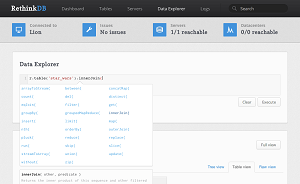News
After Corporate Failure, Open Source RethinkDB Lives On Under The Linux Foundation
- By David Ramel
- February 6, 2017
When his company that backed the open source NoSQL RethinkDB project failed commercially last October, co-founder Slava Akhmechet said: "We're brainstorming together how to transition RethinkDB to a self-sustaining open source project ... if there is a way for RethinkDB to live on, we'll find it!"
They found it.
Today the Cloud Native Computing Foundation (CNCF) announced it had purchased RethinkDB's source code and donated it to CNCF's parent organization, The Linux Foundation, where it will live on under an Apache license.
"RethinkDB is alive and well: active development can continue without disruption," co-founder Michael Glukhovsky said in a blog post. "Users can continue to run RethinkDB in production with the expectation that it will receive updates. The website, GitHub organization, and social media accounts will also continue operating. The interim leadership team will work with the community to establish formal governance for the project. Under the aegis of The Linux Foundation, the project has strong institutional support and the capacity to accept donations."
RethinkDB, with source code available on GitHub, is described thusly:
- Open-source database for building realtime Web applications.
- NoSQL database that stores schemaless JSON documents.
- Distributed database that is easy to scale.
- High availability database with automatic failover and robust fault tolerance.
Furthermore, the project description states: "It exposes a new database access model -- instead of polling for changes, the developer can tell the database to continuously push updated query results to applications in realtime. RethinkDB allows developers to build scalable realtime apps in a fraction of the time with less effort."
When the corporate effort behind RethinkDB it failed, many developer fans of the database decried its failure while more successful offerings that they deemed technically inferior -- namely MongoDB -- lived on.
In a post mortem published last month, Akhmechet pointed to a "terrible market" and "wrong metrics of goodness" as contributing factors to the demise of RethinkDB Inc. "Each mistake likely cut RethinkDB's valuation by one to two orders of magnitude," he said. "So if we got either of these right, RethinkDB would have been the size of MongoDB, and if we got both of them right, we eventually could have been the size of Red Hat."
 [Click on image for larger view.]
Using the RethinkDB Data Explorer (source: RethinkDB)
[Click on image for larger view.]
Using the RethinkDB Data Explorer (source: RethinkDB)
The company was frustrated by the success of MongoDB in the face of its own troubles. "When it became clear in mid-2014 that we couldn't compete, we worked hard to differentiate from MongoDB," Akhmechet said. "We found a very elegant way to add realtime push, hoping to enable developers to build a generation of apps they couldn't build before. But that wasn't enough. Suddenly we found ourselves competing with Meteor and Firebase, companies that were dedicated to solving the realtime problem for years before we even thought of it. Again we were three years behind the market, and again we found ourselves unable to compete."
It will now compete again, with a new 2.4 version reportedly in the works and due to debut soon. Bryan Cantrill, a member of the CNCF Technical Oversight Committee, expects the open source project to fare better under a more lenient Apache license (Apache License, Version 2.0, or ASLv2), rather than its prior AGPL license.
"Whatever your own feelings for the AGPL, it is indisputable that its vagueness coupled with its rarity and its total lack of judicial precedent makes risk-averse lawyers very nervous (especially in companies that have substantial intellectual property to protect) -- to the point that it's not uncommon for companies to ban the use of AGPL-licensed software entirely," Cantrill said in his own blog post. "This makes the AGPL anti-collaborative, and worse, it's often the point: when companies license software under the AGPL that they also make available commercially (that is, under a license palatable to the enterprise), they are exhibiting the corporate open source anti-pattern of dual-licensing for profit."
Glukhovsky shed more light on future plans in an interview on Linux.com.
"The RethinkDB community's first goal is to ship RethinkDB 2.4, which represents a shift from a federated development process to a distributed, community-based approach," he said. "The release will bring new features to seven years of development effort and a robust database used by 200k+ developers today.
"We plan to open source a number of internal tools, artwork, and unreleased features as we build a community process to drive future development forward. Future releases are also planned for Horizon, another project by the RethinkDB team that provides a realtime backend for JavaScript apps."
About the Author
David Ramel is an editor and writer at Converge 360.